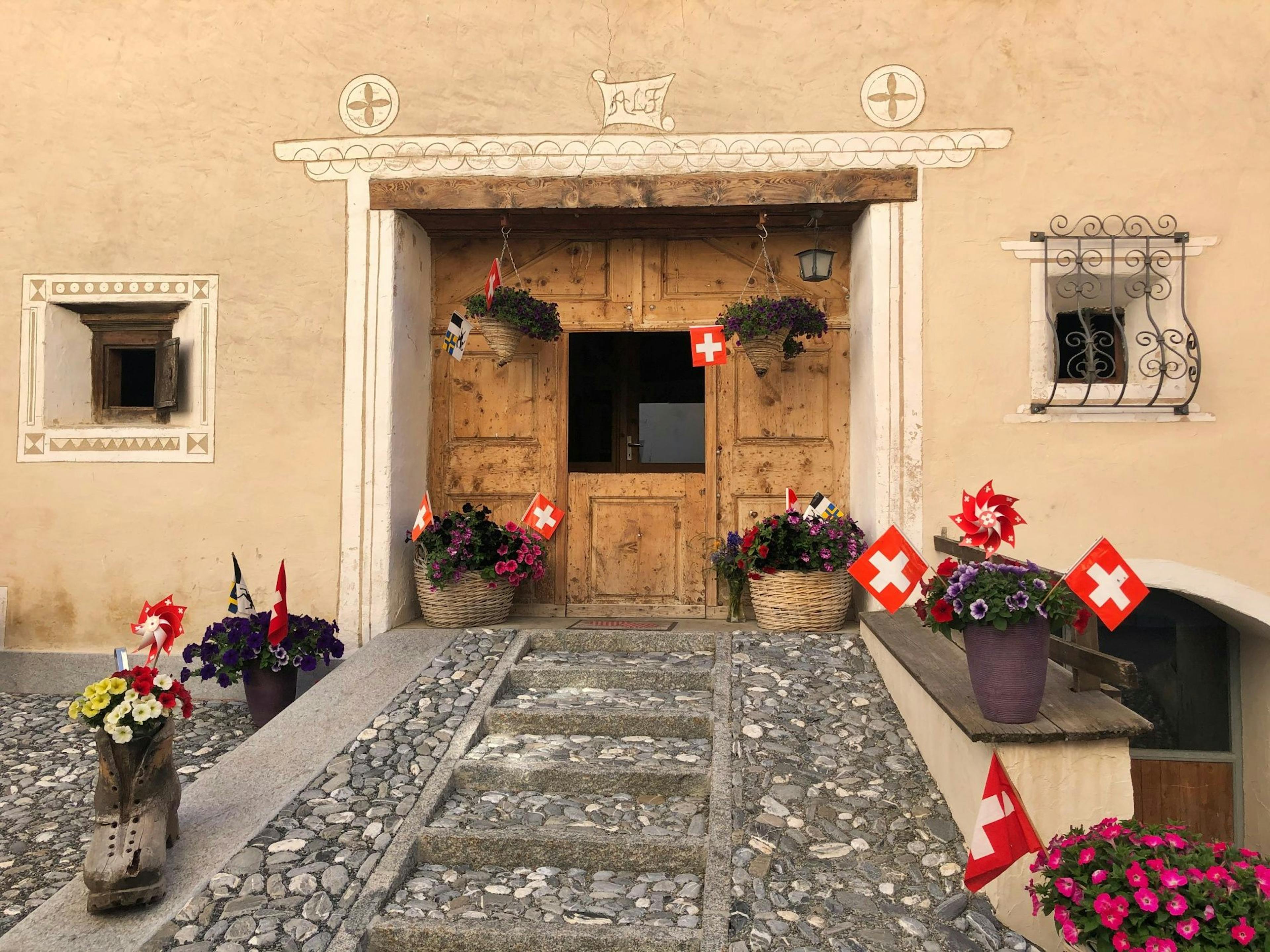
Switzerland language: Everything you need to know and where they are spoken
The official languages in Switzerland are German, French, Italian and Romansh. In addition to these four national languages, you will encounter many dialects and foreign languages. Navigating through Switzerland can be a challenge. That's why we explain here everything you need to know about Swiss language.
Switzerland is a pretty small country. And known for its breathtaking alpine landscapes, fine chocolate and precision watches, among other things. But what many people don't know is that it also harbors an amazing linguistic diversity. In a country smaller than many major cities worldwide, four official languages are spoken.
Yes, you read that right: Four.
But what makes this linguistic diversity so special?
First, it is impressive how these languages coexist in such a small geographical area. It is not uncommon for a Swiss citizen to speak several languages. Second, it is a testament to how Swiss politics and culture value and promote linguistic and cultural diversity. Rather than enforcing a single language, Switzerland has developed mechanisms to protect and preserve the rights and cultures of all language communities.
Switzerland is a pretty small country. You probably already know that.
That's why some visitors are surprised that there is not one "Swiss language". Instead, Switzerland has four official languages. In the west you will find French, in the south Italian and in the rest of Switzerland German. Or rather, Swiss German. The fourth national language is Rhaeto-Romanic, which is spoken in the southeast of Switzerland.
In addition, there are numerous dialects that make Swiss German in particular an interesting construct that puzzles many of our German or Austrian neighbors. But more about this special dialect later... First of all, here is an overview of where in Switzerland which language is spoken.
Official language of Switzerland
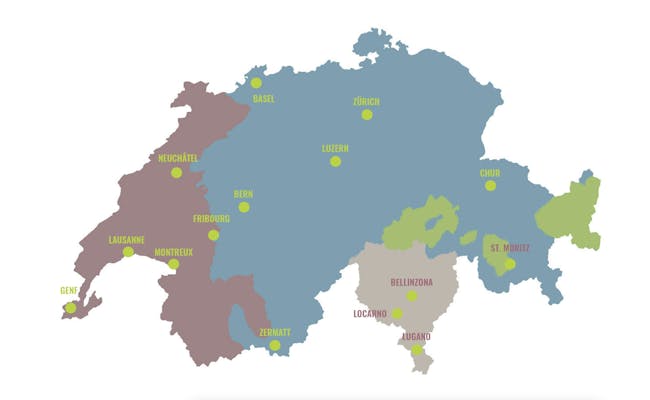
Where is German spoken in Switzerland?
German is the most widely spoken Swiss language, accounting for over 60%. The map shows the German-speaking part of Switzerland in blue. German is the only official language in 17 of the 26 Swiss cantons. These are the cantons of Aargau, Appenzell Ausserrhoden, Appenzell Innerrhoden, Basel-Stadt, Basel-Landschaft, Glarus, Luzern, Nidwalden, Obwalden, Schaffhausen, Schwyz, Solothurn, St. Gallen, Thurgau, Uri, Zug and Zurich. In the cantons of Bern, Fribourg and Graubünden, both German and other languages are represented
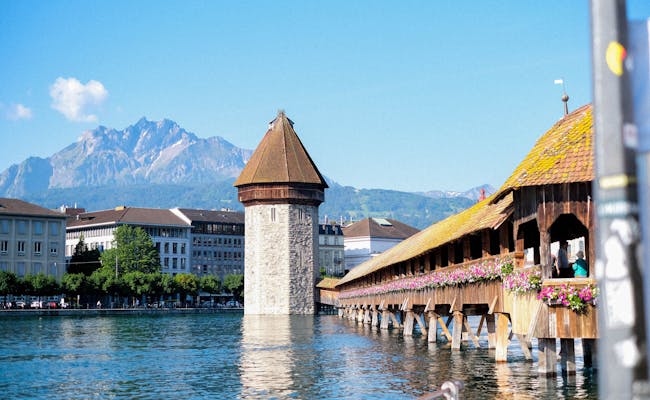 In Lucerne, German is the official language of Switzerland (Photo: Unsplash Geertje Caliguire)
In Lucerne, German is the official language of Switzerland (Photo: Unsplash Geertje Caliguire)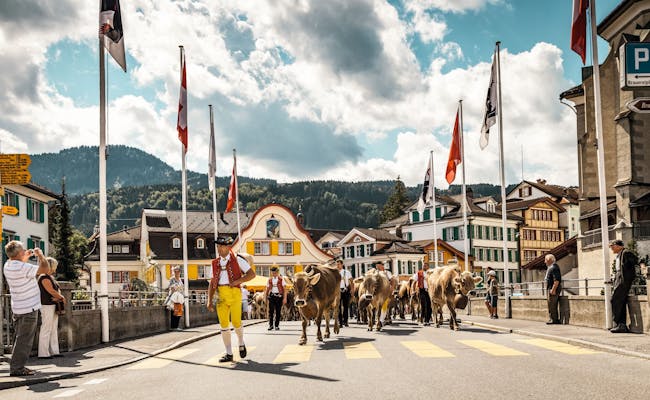 Just like in Appenzell (Photo: Switzerland Tourism Jan Geerk)
Just like in Appenzell (Photo: Switzerland Tourism Jan Geerk)Where is French spoken in Switzerland?
French is spoken by over 20% of the Swiss population. The map shows the French-speaking part of Switzerland in red. In the cantons of Geneva, Jura, Neuchâtel and Vaud, French is the only official language. Together with German, French is the official language in the cantons of Bern (majority German), Valais (majority French) and Fribourg (majority French).
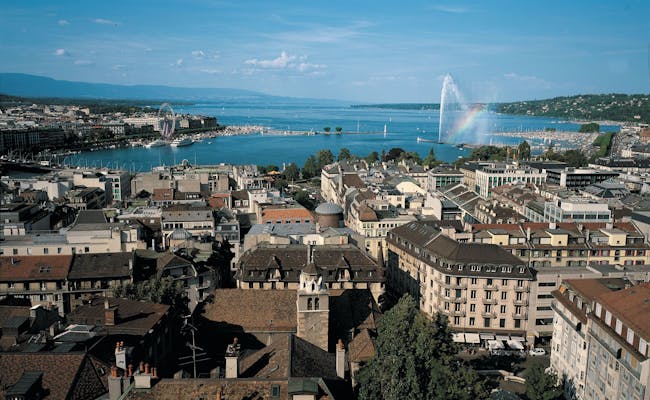 View over Geneva (Photo: Switzerland Tourism Stephan Engler)
View over Geneva (Photo: Switzerland Tourism Stephan Engler)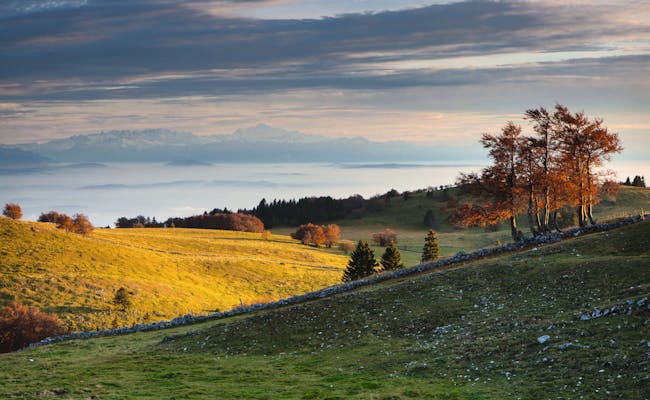 Green meadows in the Neuchâtel Jura (Photo: Switzerland Tourism Roland Gerth)
Green meadows in the Neuchâtel Jura (Photo: Switzerland Tourism Roland Gerth)Where is Italian spoken in Switzerland?
At 8%, Italian is less widely spoken than German and French. Nevertheless, the language is an integral part of the Swiss linguistic landscape. You will find it partly in the southern regions of the Grisons and Valais. However, Italian is mainly spoken in the canton of Ticino. Here it is the only official language. On the map you can see the Italian-speaking part of Switzerland in gray.
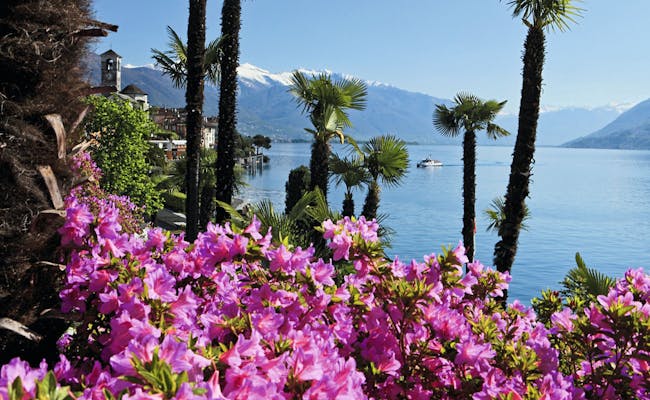 View of Lake Maggiore (Photo: Switzerland Tourism Christof Sonderegger)
View of Lake Maggiore (Photo: Switzerland Tourism Christof Sonderegger)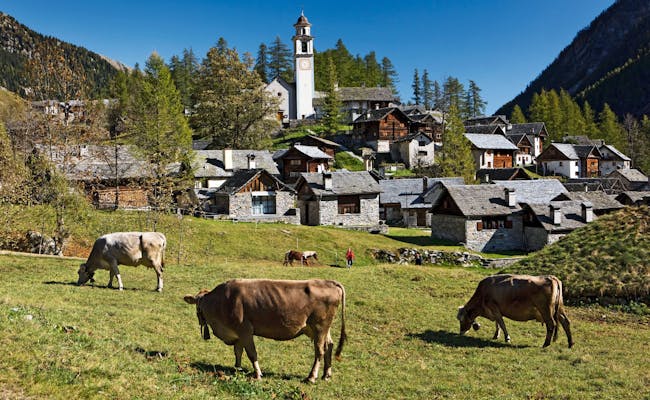 Small mountain village in Ticino (Photo: Switzerland Tourism Christof Sonderegger)
Small mountain village in Ticino (Photo: Switzerland Tourism Christof Sonderegger)Where is Romansh spoken in Switzerland?
Rhaeto-Romanic is the Swiss language with the smallest linguistic share in Switzerland. Just 1% of the population speaks Romansh. If you want to hear this special language, which somewhat resembles a mixture of French and Italian, you have to go to the trilingual canton of Graubünden Here, three official languages have equal status on official paper: German, Italian and Romansh. The time-honored language with Latin roots is very present in everyday speech.
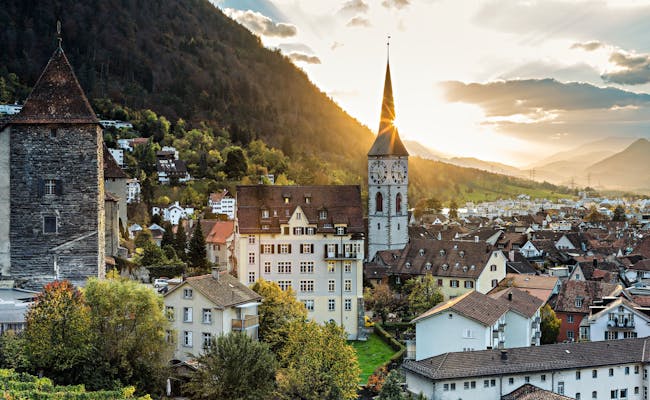 Chur at sunset (Photo: Switzerland Tourism Andreas Gerth)
Chur at sunset (Photo: Switzerland Tourism Andreas Gerth) Landscape in Graubünden (Photo: Switzerland Tourism Christian Meixner)
Landscape in Graubünden (Photo: Switzerland Tourism Christian Meixner)What is Swiss German?
Swiss German is a special construct. And probably as Swiss as any Swiss language gets...
First, there is no such thing as the Swiss German par excellence. German-speaking Switzerland has a great variety of different dialects. An Appenzeller and a Berner use different words just as much as a Bündner and a Basler do. But basically we understand each other quite well. Except for a few typical words that each dialect uses differently again. Some characteristics that Swiss German brings along are the following:
- There is no spelling. No rules. Swiss German is spoken as one's beak grows. This often leads to heated discussions between members of different dialects about how to say something correctly. But since there is no spelling, there is no right and wrong
- Swiss German is only spoken and is therefore not a written language. Of course, informal messages between friends, families and acquaintances, especially among the younger generations, are often written in Swiss German. But officially, written German is the valid written language.
- Our German neighbors often have trouble understanding Swiss German. If they live in southern Germany, roughly up to and including Stuttgart, they often understand us quite well. But the further north they are at home, the more incomprehensible our dialects seem to them To show you a few differences between German and Swiss German, we have put together a little table for you. As you can see, there are sometimes different words for the same term in Switzerland, depending on the dialect
| German | Swiss German |
|---|---|
| carrot | Rüebli |
| croissant | Gipfeli |
| breakfast | Zmorge |
| lunch | Zmittag |
| dinner | Znacht |
| potato | Härdöpfel / Äerdli |
| gossip | Schnädertante |
| to go shopping | go poschte / iichaufe |
| to cry | brüele / brööle / hüüle |
| swing | Gigampfi / Riitiseili / Riitiplampi |
| peas | Buärli / Erbsli |
| to ride an inflatable boat | böötle |
| bottle | Guttere |
| be that as it may | item (widespread in the canton of Bern) |
| runny nose | Schnuderi / Pfnüsel |
| larynx | Gurgeli |
| Guinea Pig | Meersäuli |
Other Swiss languages
An estimated 6% in Switzerland speak English as their main language. You can usually get around our country with English without any problems. It is now considered the secret fifth national language. When Swiss people from different language regions meet, they often prefer English to one of the official national languages. Switzerland is popular as a country of immigration. With foreigners making up over 25% of its population, Switzerland ranks fourth in the world after Singapore, Australia and New Zealand. Portuguese, Albanian, Serbo-Croatian or Spanish are not rarely heard. With a share of over 1%, they lead the long list of Switzerland's 40 other languages. You think Latin is dead? Not in Switzerland. We like to use it for neutral communication, to deliberately favor none of the national languages. Especially when it comes to nationwide projects or initiatives: Pro Senectute, Pro Natura, Pro Patria, Confoederatio Helvetia (written on coins/stamps), just to name a few.
Is English spoken in Switzerland?
Many Swiss people usually speak good English. Especially in the cities, you can generally communicate easily in most situations. English is taught early in schools and is part of general education. Thanks to its linguistic diversity, Switzerland is a very travel-friendly country. You'll encounter multilingual people who are happy to help you regardless of your language skills.
Of course, we can't generalize this. There are places in Switzerland where English is not commonly spoken. Particularly in rural areas, you might receive an awkward shake of the head in response to the question "Do you speak English?"
In remote areas, multilingualism has its limits. A good translation app can come in handy. However, you also encounter a very authentic Switzerland with people who are deeply rooted in their local culture.
Do all Swiss people speak multiple languages?
Every student must learn at least one additional official language. Therefore, most Swiss are proficient in two national languages plus English. Also, children in the German-speaking part of Switzerland learn High German as a written language from their first day of school. Thus, written German is considered their first foreign language. Their Swiss German remains their mother tongue as a dialect.
So, the Swiss grow up with multilingualism, even if they don't speak all national languages fluently. All products display at least the three main national languages on their labels: German, French, and Italian. Announcements at airports and train stations, on trains, and in other public spaces are made in the three national languages plus English. The same advertisements exist in various language regions, each in the local national language. Each language region has its own radio and TV stations in their respective official languages. The high level of education and the multilingualism of its residents make Switzerland an attractive location for international companies. As a visitor, you rarely encounter language barriers and meet linguistically skilled, helpful people.
What is the Röstigraben?
Rösti is a typical potato dish from Switzerland. The so-called "Röstigraben" represents the language boundary between the German-speaking and French-speaking parts of our country. It is also the invisible dividing line between the cultures of Switzerland's two largest language regions. These cultural differences often stand out in political voting results.
Along this line lies a series of bilingual cities:
- Sierre/Sitten (almost 90% French)
- Fribourg/Freiburg (around 80% French)
- Bienne/Biel (over 40% French)
- Murten/Morat (15% French)
Biel is the largest bilingual city and is considered a model student in this discipline nationwide. However, the other cities are not far behind. For example, both language groups celebrated the 125th anniversary of the Fribourg Gastronomy Association together without any issue.
Fribourg is linguistically divided by a natural border. If you cross the Saane from the German-speaking east, you'll already be addressed in French on the other riverbank. Fribourg authorities operate in both official languages, and you'll find a consistently bilingual education system. This is a clear example of the linguistic and cultural coexistence of these cities at the Röstigraben.
Swiss Activities Tip:
As soon as you cross the Röstigraben on the train, you'll notice it right away. While announcements in Bern are initially made in German, the station in Fribourg is already announced in French. Pay attention to the language of the train conductors. They also automatically switch languages depending on the side of the language boundary they are addressing their customers.
Is English spoken in Switzerland?
Sure, the official languages of Switzerland are German, French, Italian and Romansh, but that doesn't mean English isn't present here. An estimated 6% in Switzerland speak English as their primary language. Moreover, many Swiss are quite fluent in English, especially in urban areas and among younger people.
Switzerland, as a global business and tourism center, has many English-speaking expats and tourists, which reinforces the need for many Swiss to speak English. English is taught early in schools and is part of general education.
Thanks to its linguistic diversity, Switzerland is a very travel-friendly country. You will meet multilingual people who will be happy to help you regardless of your language skills. Of course, we can't generalize here. There are also places in Switzerland where English is not widely spoken. Especially in rural areas, you may get an embarrassed shake of the head when you ask "Do you speak English?".
Naturally, in remote areas, multilingualism reaches its limits. That's where a good translation app can come in handy. Instead, you'll encounter a very authentic Switzerland with people who are strongly rooted in their local culture.
Do all Swiss speak several languages?
With this diversity of languages in such a small area, the question naturally arises as to how multilingual the Swiss are.
In fact, many Swiss grow up bilingual or even multilingual, not only because of the official languages, but also because of the country's geographical location and its educational policies. It is not uncommon to meet someone living in Zurich who speaks Swiss German as their main dialect, but is also fluent in French and perhaps even Italian or Romansh. Proximity to countries like Germany, France and Italy also encourages the learning of these languages.
In addition, the Swiss education system places great emphasis on language instruction. Children start learning a second Swiss language in elementary school and often add English later in their school career. Or they start with English and learn a second national language next. In addition, schoolchildren in German-speaking Switzerland learn High German as a written language from the first day of school. Thus, High German is considered their first foreign language. Their Swiss German, however, always remains their mother tongue as a dialect.
Multilingualism is considered a valuable asset in the Switzerland language environment, not only opening professional and cultural doors, but also contributing to national identity and strengthening ties between the country's different language communities.
The Swiss are thus growing up multilingual, even if they do not speak all the national languages. For example, all products have at least the three main national languages on their labels: German, French and Italian. Announcements at airports and train stations, on trains or in other public spaces are also usually made in several languages. And the same advertising is available in the local language in each of the different language regions. Each language region has its own radio and TV stations in its official language.


With this knowledge in mind, you are now well informed for your trip through Switzerland. You know that there is not the official Switzerland language and you can score with extra knowledge in every trivia night.
Discover leisure activities
Book NowTop Destinations
Top Activities
